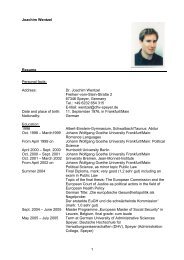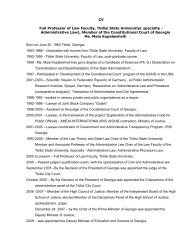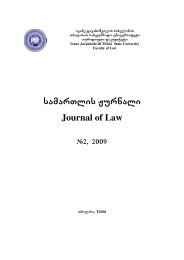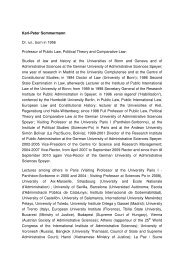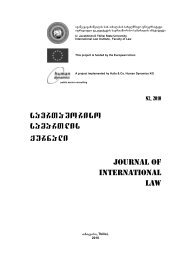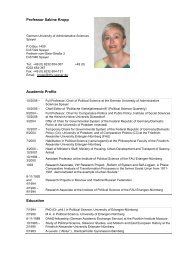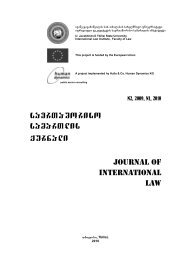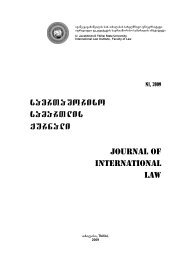Untitled
Untitled
Untitled
Create successful ePaper yourself
Turn your PDF publications into a flip-book with our unique Google optimized e-Paper software.
saerTaSoriso samarTlis Jurnali, #1, 2008 JOURNAL OF INTERNATIONAL LAW, N1, 2008<br />
in ensuring the physical and mental wellbeing<br />
of children. Government agencies should give<br />
high priority to programmes for young persons<br />
and provide sufficient resources for the effective<br />
delivery of services, facilities and staff for<br />
adequate medical and mental health care,<br />
nutrition, housing and other relevant services,<br />
including drug and alcohol abuse prevention<br />
and treatment, ensuring that such resources<br />
reach and actually benefit young persons.<br />
The Beijing Rules clearly stresses the importance<br />
of the rehabilitation/reintegration process.<br />
Furthermore, the promotion of juvenile<br />
welfare is viewed as only one of the objectives<br />
of comprehensive social policy for juveniles<br />
that shall, play a crucial role also in prevention<br />
of juvenile delinquency.<br />
The aim of the paper is to represent the<br />
international legislation for the protection of<br />
the children that deprived their liberty<br />
Fundamental principles underlying<br />
any approach to issues of juvenile justice<br />
include: – The minimum age for criminal responsibility<br />
should be the age of 15 or as close<br />
as possible to that age; – presumption of innocence;<br />
– due process guarantees; – immediate<br />
notification of parents or guardians and<br />
their right to be present upon the apprehension<br />
of a juvenile; – avoiding detention before<br />
trial if possible and ensuring that any pre-trial<br />
detention is for the shortest possible period<br />
and only as the last resort; – right to facilities<br />
and services that meet all the requirements<br />
of health and human dignity, and to adequate<br />
medical care, both preventive and remedial;<br />
– prohibition of all disciplinary measures constituting<br />
cruel, inhuman or degrading treatment<br />
including corporal punishment that may<br />
compromise the physical or mental health of<br />
the juveniles concerned; – right to fair and<br />
humane treatment, including the right to visits,<br />
to privacy, to communication with the outside<br />
world and to time for daily exercise; – provision<br />
of education (provided outside the detention<br />
facility by qualified teachers) suited to<br />
his her needs and designed to prepare him<br />
her for return to society; – ensuring that children<br />
are detained separately from adults unless<br />
they are members of the same family; –<br />
prohibition of death penalty<br />
A proper approach to juvenile justice also<br />
requires that efforts be made to prevent children<br />
coming into conflict with the law in the<br />
first place.<br />
Juvenile justice is a broad topic covering<br />
prevention of delinquency, the type of offences<br />
with which children may be charged and<br />
the way they are treated by the police, by the<br />
courts and in facilities for juvenile offenders.<br />
Therefore it is a multiple, inter-connected functional<br />
systems with different players .<br />
The functioning of a specific JJ system is<br />
often judged by whether it is:<br />
• effective; and<br />
• fair and humane – It must respect human<br />
dignity judged by references to international,<br />
regional and domestic JJ and HR standards<br />
and be considerate of the developmental<br />
needs (well-being) of a juvenile<br />
involved.<br />
Therefore states have to balance interest<br />
of the vulnerable juveniles from one hand and<br />
protection of society from the other through<br />
effective use of state resources.<br />
The aim of Juvenile Jusice system is to<br />
encourage a behavioral change of a juvenile<br />
involved by helping him/her to feel accountable<br />
and to understand the consequences of<br />
his/her actions; avoid or minimize intervention<br />
by the formal justice system; promote reintegration<br />
as the main goal of treatment; employ<br />
other than punitive responses (such as deprivation<br />
of liberty).<br />
In order to avoid or minimize the intervention<br />
by the formal justice system, various alternative<br />
programs were developed to reach<br />
that aim. But the alternative programs are<br />
designed and limited to the: 1. first-time offenders,<br />
2. offenders accused of non-serious<br />
acts 3. offenders who admit the offence:<br />
Alternative programs include: 1. police<br />
caution – the police decide not to press formal<br />
charges but simply to warn the juvenile<br />
and parents that any recurrence of that behavior<br />
will result in a court appearance; 2.<br />
French Rappel a la loi – formal meeting of<br />
representatives of court, juvenile and parents<br />
within which the juvenile is appraised of the<br />
legal text relating to the offence as well as of<br />
the potential sentences of the court; 3. Screening<br />
process carried out by a social worker<br />
before the court appearance and offer that if<br />
the juvenile agrees to the offence and than<br />
can satisfactorily complete a special course<br />
the prosecution will drop the case.<br />
In Scotland “children’s hearings” system<br />
conditions of the hearing are less formal and<br />
adversarial than in court setting; a panel of<br />
166




